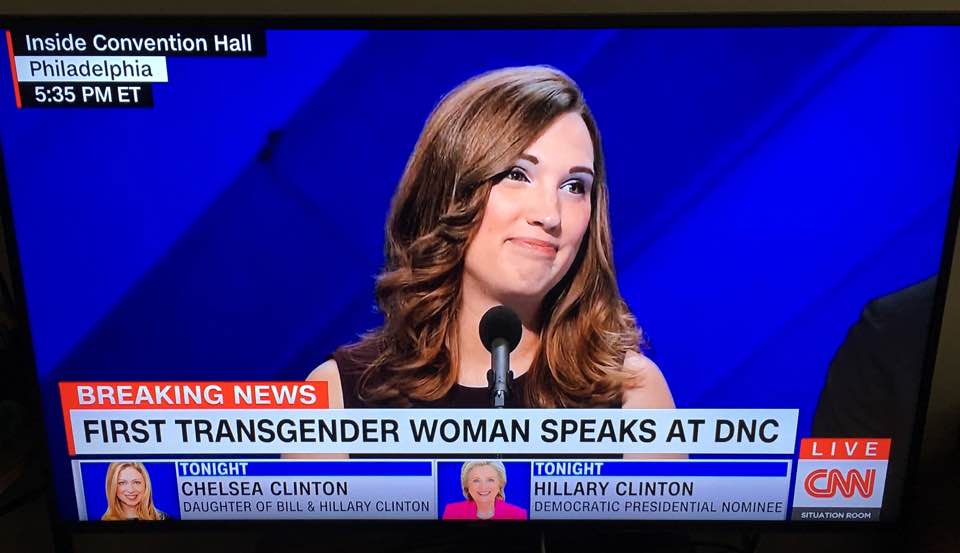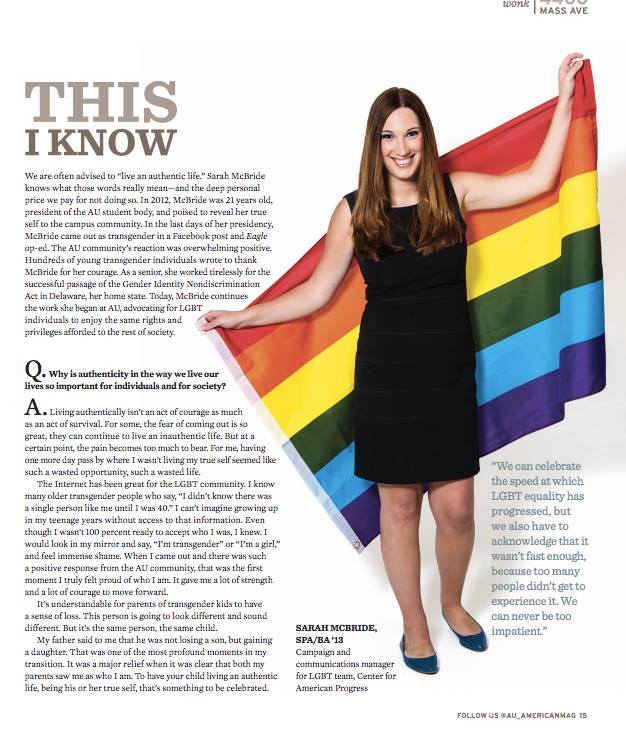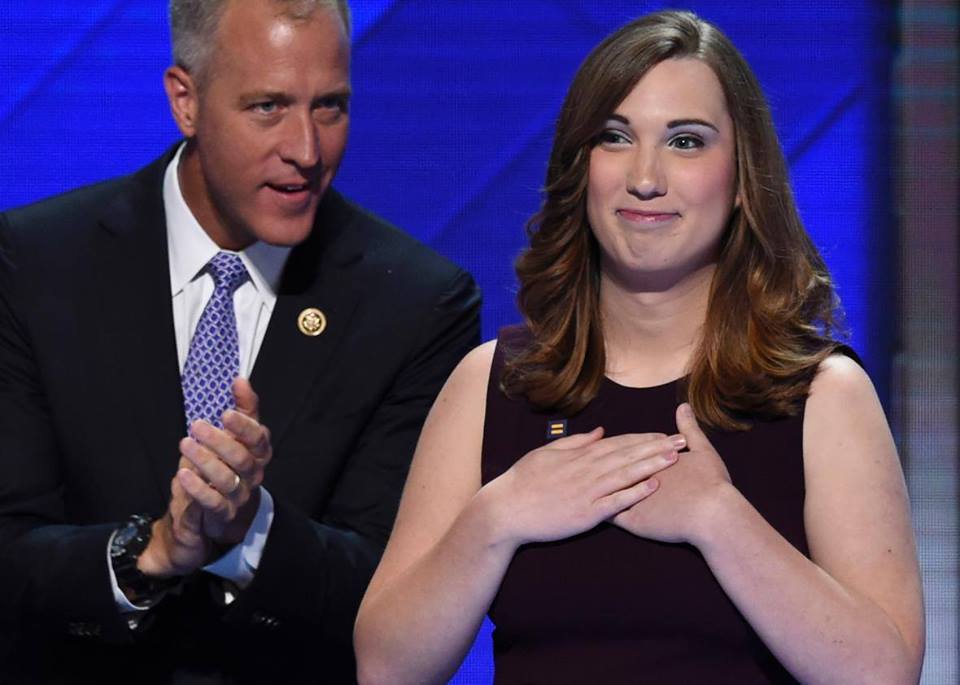We Talked to Sarah McBride About Her Viral Takedown of Clint Eastwood

By:
I couldn't believe it was Clint Eastwood, of all people, who indirectly connected me with Sarah McBride. After writing about her thoughtful Twitter takedown of Clint Eastwood regarding his troubling comments on "political correctness," I had the opportunity to interview the National Press Secretary at the Human Rights Campaign and first openly transgender speaker at a national party convention.
 Sarah McBride/Facebook - facebook.com
Sarah McBride/Facebook - facebook.com
McBride, an LGBTQ activist, came out as transgender at American University, where she was student body president. Before that she worked on campaigns for the late General Beau Biden and Delaware Governor Jack Markell (D). At 24, she married her boyfriend Andrew "Andy" Cray, who sadly died four days later from a determined battle with cancer.
We spoke about Eastwood, Republican presidential nominee Donald Trump, what motivates her, and what's really at stake in this election.
ATTN: You've said you think Eastwood is showing "a lack of understanding of what’s at stake" so can you tell everyone now, in plain terms, for those not quite getting it: what is at stake?
McBride: I think at stake is really two fundamentally different visions for this country. One vision that continues in this trend of expanding opportunity and deepening our understand of what "we the people" means to communities that have historically been excluded. And another vision that not only seeks to halt progress, but really seeks to move back the clock to a period of time when large swaths of the American public were either forced into the shadows or facing widespread discrimination or violence.
And I don't think it's an understatement to make that stark contrast as dramatic as I just did. I think Donald Trump has run an entire campaign on not just fear, but outright hatred and discrimination. And the oppositions to his plans aren't just small gripes. These are uniquely, and really historically, discriminatory and likely unconstitutional proposals.
This isn't a battle between two different ideologies. This is a battle between someone who is qualified and fit to be president, whether you agree with her on every issue, and someone who is wholly unqualified and wholly unfit as the commander-in-chief and President of the United States. This is unlike any election we've ever had in the past.
ATTN: I am still honestly amazed it's gotten to this point, that [Donald Trump's] made it this far.
McBride: I think it's shocking. Not that there's this frustration or anger out there, but that someone like Donald Trump, someone who does not even try to present a positive, forward-looking vision for this country [is the Republican nominee]. He's presenting nothing but negativity and fear and really to the degree that he's offering solutions is that we should go back to an era in this country that was really terrible for a lot of people.
ATTN: It's a little shocking, really.
McBride: It is, it is. Eastwood's "Esquire" interview wasn't a whole-hearted, total love-fest for Donald Trump, far from it. Clint Eastwood was certainly critical of Donald Trump in some respects. But his comments, the overarching theme of what he said, did present a Trump-like nostalgia for a period of time that we are better for having progressed from.
My point [with these tweets against Eastwood] was that when he says, "these things weren't racist when I was growing up" well, 1930's understanding of racism in America is not a good barometer for what is and is not actually racist. It's sort of baffling that someone who has seen so much progress in their life on issues of race, with obviously still a lot of work to do, could think that a 1930's or 1940's approach to the issue is appropriate, or fair, or right. It's not a matter of his age — it's a matter of U.S. history.
ATTN: What are some things you think we can do to inspire young people to get out and actually vote?
McBride: I think one thing is that we can't underestimate the threat of Trump's candidacy and the potential for Trump to theoretically win. We can't rest on our laurels and say, "he's too extreme and his poll numbers are too low for him to have a chance." Because if we do rest on our laurels, if we do assume it's all going to be okay, if we stay home, then that is the path for which Donald Trump could actually win. So we can't be complacent.
I think also we need to consistently and very loudly articulate what the stakes are. And I think part of that includes demonstrating that Donald Trump is a threat to Muslims, he's a threat to Muslim-Americans, he's a threat to people of color, he's a threat to people with disability, he's a threat to women, to immigrants, but he's also a threat to LGBTQ people. Despite his sort of protests to the contrary, despite him saying the letters "LGBTQ" at the convention, he has run a campaign that has persistently and consistently articulated and endorsed anti-LGBTQ positions and his first governing decision as nominee was to pick someone for Vice President whose entire national profile rests on being anti-LGBTQ.
We need to really underscore for Millennials who care about LGBTQ issues and equality that Donald Trump poses a serious threat not just to forward progress, but to the progress we've made for the last eight years.
ATTN: What are some things people can do to show their support for the trans community and be a good ally?
McBride: One, in the coming months, is for people to vote! We need people to stand up and participate. We need to vote like their friends' lives depend on it, because for LGBTQ people and trans people in particular, our lives do depend on the outcome of this election.
Certainly everyone should continue to seek out resources and opportunities to educate themselves, to learn, and grow in their understanding of what is the proper way, how to respect trans people and trans identities. It's not as complicated as people think it is. There always are improvements that people can make to make sure they're treating everyone with kindness and respect.
 Sarah McBride/Facebook - facebook.com
Sarah McBride/Facebook - facebook.com
It's speaking up when they hear jokes, when they hear comments that diminish trans peoples' identities and undermine the dignity that we all hold as people. It's also writing their legislators, writing their members of congress, and demanding action to pass comprehensive non-discrimination protections for LGBTQ people. And to support and act on the other host of issues that LGBTQ people still so desperately need to be implemented, ranging from efforts to combat violence against transgender women of color, to ending the HIV and AIDS epidemic, to inclusive and welcoming school environments. We need people to stand up and to speak out at the local and state federal level for these types of policies to be implemented.
ATTN: I think it's easy to forget that actual lives are at stake.
McBride: There are real people at the center of this who will face real and dangerous outcomes and consequences if Donald Trump and Mike Pence are elected, but also if a whole host of senators, representatives, governors, mayors, and city councilors are elected or reelected.
A lot of the attacks that LGBTQ people have faced over the last year have been at the state level. [Governor] Pat McCrory, for instance, in North Carolina, is in a really close race with the the state's attorney general, and one of the main issues in that race is the anti-trans policies implemented by Pat McCrory and the damage its done to the state's economy and public image.
The stakes are high. Every election we always say, "this is the most important election in our lifetime" but really — this is. One outcome is probably one of the gravest threats to vulnerable communities in this country and really to the health of our democracy. That sounds hyperbolic but Donald Trump is unlike any nominee for a major party we have seen in...honestly, I mean in...decades, if not a century.
ATTN: Switching to happier thoughts, how did you prepare for your historic DNC speech? And what was going through your mind?
McBride: I found out about a week before the convention that I'd be speaking and I took a couple days the week before the convention to put together my remarks. I only had three minutes [to speak]. It was both not a lot to write but also much more difficult to figure out, "okay, I only have three minutes, what do I want to say?" And I wrote it, and practiced it a couple of times.
But honestly, I was so busy the week of the convention doing interviews back-to-back-to-back that I didn't have much time to practice or really to think about it, which probably was a blessing!
I was so nervous but once I got on the stage, and once I could feel the love that was in that area, the support for equality that was in that arena, the excitement that was in that arena for just all of the history that was going on in that convention, I felt at ease. I felt totally comfortable.
 Sarah McBride/Facebook - facebook.com
Sarah McBride/Facebook - facebook.com
I think for me, there were a lot of things on my mind. I was thinking about my husband, Andy. I was thinking about the trans person in North Carolina, or North Dakota, or Texas, who is wondering if this country has a place for them too. That I hoped that my speech would give them a little bit of comfort, and a little bit of hope that things were changing. Certainly some security in knowing there are leaders in this country, people like Hillary Clinton, who have their backs, who see them, and who know that they are worthy and that they are valued.
I was thinking about my parents, who were in the audience and who I could see throughout the entire speech, and hoping that despite how scared they were when I came out — that my professional life would be over, that I would be rejected by my community — that they could see me stand on that stage and know that, at least for me, everything was going to be okay.
And finally, I wanted to do the trans community proud. I wanted to do right by them, and make sure that I utilized my short time on that stage to help push the ball forward ever-so-slightly on the issue of trans equality.
ATTN: You just turned 26, but it seems like you've already lived numerous lifetimes. What motivates you to keep going, and not only to keep going, but to go further? Where does that come from?
McBride: I think there are a couple things. One, in my advocacy as I talked about in my speech, obviously, my experience and relationship with Andy really, really, really underscored the urgency of this fight. As Dr. King said, "We are confronted with the fierce urgency of now." I feel that really strongly, and really intently. And that sense of urgency provides me with a lot of energy and a lot of inspiration to work as hard as I can, and to do as much as I can right now.
Coming out as trans and being transgender, with the exception of the experience of Andy, has been the hardest thing that I've had to deal with. But at the same time, my experience was relatively easy compared to the experience of most transgender people. And when I think about how hard that was for me, and therefore just how difficult and just how challenging and just how scary it must be for someone who's worried about losing their family, who thinks they might lose their job, who has lost their job, who's been rejected by their friends, and feels so alone and so isolated, and they're in the middle of a place where they can't even look to their government for protection? It's almost unfathomable to me.
 Sarah McBride/Facebook - facebook.com
Sarah McBride/Facebook - facebook.com
I want to make the privilege I've had a reality for everyone. I think knowing how hard it was for me and knowing that that's just a small percentage of the difficulty faced by most people inspires me and moves me to work towards the change I'm working towards, and to fight the fight.
More broadly, I think that's always been what I have viewed as a life well-lived as including — which is to make a difference in your community and your world, to leave this place just a little bit better than how you found it. To, as the President says, to help write our own chapter in this long story, or even our own paragraphs in this chapter within this longer book. To make as much of a difference for as many people in as many ways as possible.
To see where your legislators stand on LGBTQ issues, visit http://www.hrc.org/your-elected-officials.
